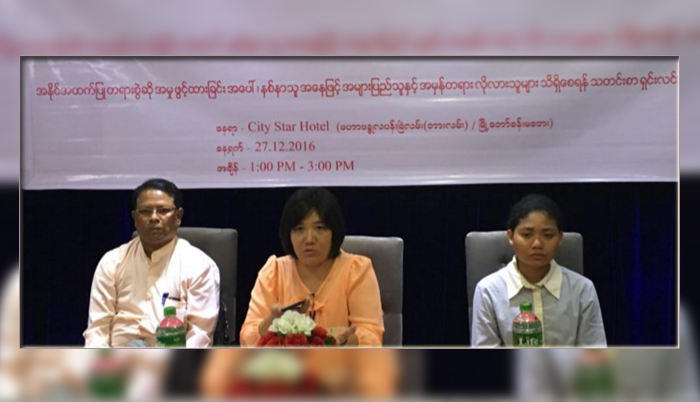![]() Home > Myanmar
Home > Myanmar
New Treatment-Oriented Drug Policies To Be Proposed

The Rangoon government destroys over US$19.7 million worth of seized narcotics to mark the International Day against Drug Abuse and Illicit Trafficking on June 26, 2016. / Hein Htet / The Irrawaddy
![]() December 23rd, 2016 | 09:22 AM |
December 23rd, 2016 | 09:22 AM | ![]() 1397 views
1397 views
RANGOON
After a review of Burma’s 23-year-old narcotics legislation, a new policy with a treatment-oriented approach on drug addiction will be set up, the Central Committee for Drug Abuse Control (CCDAC) has said.
According to the CCDAC—a government organization central in drafting the new policy—a working group comprised of several civil society organizations and government ministries reviewed Burma’s 1993 Narcotic Drugs And Psychotropic Substances Law.
Police Col. Zaw Lin Tun, head of CCDAC’s project department, told The Irrawaddy on Thursday that a draft version of the amended legislation had been submitted to the President’s Office; it strives to ensure an effective treatment plan for drug users rather than prescribe legal punishment and imprisonment. A national policy on drug control will be proposed to Union-level decisionmakers in January 2017, and consultations with civil society groups will continue in February and March.
“We found out that the drug abuse problem in the country has not decreased while practicing punishment policies,” he said. “It made us realize that our policies were never the right approach since the problem has not become smaller.”
The police colonel also highlighted the need to find the root causes of drug addiction, which policymakers previously neglected to explore.
“People recognized drug addiction as a social problem in the past and some would even say it’s a character loss that should be punished,” Col. Zaw Lin Tun explained. “In fact, drug addiction is a chronic disease that can be cured.”
“Drug users are not criminals. They deserved to be considered as patients,” he said.
Dr. HtayOung, a psychiatrist who has been practicing in the country for more than 20 years, also participated in the policy drafting workshops.
“I hope the new legislation will ensure a policy for drug users to get exempted from legal punishment to some extent, and [instead] provide them with rehabilitation and reintegration programs,” he told The Irrawaddy.
He also emphasized that the new policy be considered as paving a platform and allocating budget for the implementation of harm reduction programs for drug addicts.
Anyone found guilty under Burma’s 1993 narcotics law “shall be punished with imprisonment for a term, which may extend from a minimum of 5 years to a maximum of 10 years and may also be liable to a fine.”
“It would be a pity for young addicts to waste five years of their youth in prison,” U HtayOung said.
Burma is currently the second largest producer of raw opium in the world, after Afghanistan, according to United Nations Office on Drugs and Crime (UNODC).
Source:
courtesy of THE IRRAWADDY
by TIN HTET PAING
If you have any stories or news that you would like to share with the global online community, please feel free to share it with us by contacting us directly at [email protected]